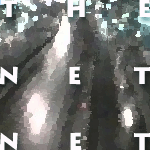We've all had the experience of receiving a beautifully wrapped
gift and finding that the contents didn't live up to the presentation.
Like Douglas Coupland's other books, Polaroids From The Dead is
a clever packaging ploy, a nicely wrapped parcel with lots of
excelsior inside and only a few gems among the random objects he has
wrapped up for us.
Coupland has a narrow but occasionally disarming
talent--he's able to convey a certain reminiscent wistfulness about
fragmentary experiences in a gentle, low-key manner. Unfortunately,
he's been painted as a pundit of the times, and here and there in this
collection he seems to have taken his press a little too seriously.
He's no major social critic though--he's that old-fashioned thing, a
writer of belles-lettres.
The book is a collection of republished
pieces cemented with black and white photos from a number of sources.
Like Generation
X, Polaroids is an odd shape; the novel was published in a square
format with margin illustrations, which was a "lie" about its
fictional nature--it suggested a social critique; this book, also
square, looks like a scaled-down coffee-table book, but that's also
misdirection: you might expect a collaboration with a photographer,
but it's not. The photos are a lagniappe, a casual postmodern tossoff
which add little or nothing to the book's substance.
So what's
inside? The first ten pieces are short fictions with Jenny
Holzer-like titles: "You Fear Involuntary Sedation," "You Are
Exhausted By Risk," and so on, featuring second-generation hippies and
loosely focused on the Grateful Dead.
Coupland illustrates different attitudes toward the dead/Dead era of
the sixties, from adulation to fear to scorn to compulsive
prolongation. It's cool intelligent disengaged writing that doesn't
tell you very much about anything.
The second section has ten miscellaneous pieces, including an aimless
and rather embarrassing "Letter to Kurt
Cobain" ("I had never asked you to make me care about you, but it
happened--against the hype, against the odds--and now you are in my
imagination forever") and the two best pieces in the book, "Lions Gate
Bridge, Vancouver, B.C., Canada" (originally with the far better title
"This Bridge Is
Ours") and "The German Reporter." In the first, Coupland abandons
his rootless pose and gets back to his home and some actual uncool emotion
about something he cares about (suddenly you remember--hey yeah, he's
Canadian); in the second, a young reporter's visit reminds Coupland
of his younger self: it's in this kind of writing, oblique, evocative
yet unsentimental, that you can see what Coupland is good at, instead
of what he's supposed to be good at.
The remaining
pieces also vary, as a collection of magazine pieces usually does.
There's a piece about Palo Alto and some vaguely meditative stuff from
the Bahamas.
The final piece is a fifty-page description of the
Brentwood area of Los Angeles, with photos of Fred MacMurray, an
aerial view of Brentwood, Marilyn Monroe,
highways, Prozac capsules
and, inevitably, O.J. and Nicole. It's the kind of piece Coupland
wants to write, standing so far back from the topic that a kind of
glass-brick postmodern irony is erected between him and the
subject--in this case, not just of a neighborhood, but of a whole
zeitgeist:
It has been said that as animals, one factor
that sets us apart from all other animals is that our lives need to be
stories, narratives, and than when our stories vanish, that is when we
feel lost, dangerous, out of control and susceptible to the forces of
randomness. It is the process whereby one loses one's life story:
"denarration." [...] The West Coast continues to be a laboratory of
denarration.
Coupland does have an eye on our fragmentation and rootlessness, and the
fleeting nature of these short pieces is in tune with his talent; still,
Polaroids from the Dead is more style than substance. Although even
to say so is to betray that one hasn't caught the ironic, postmodern joke,
it's your buck.



